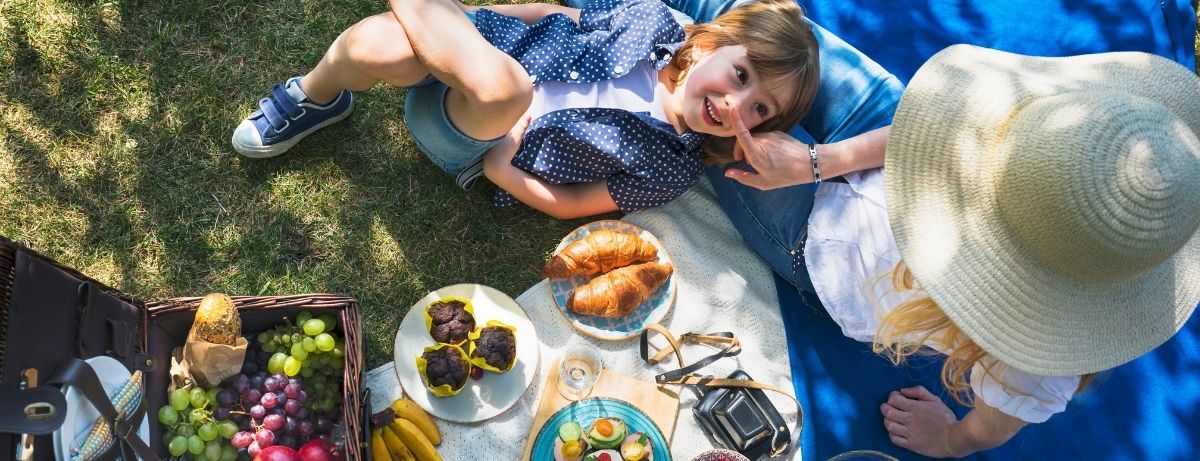Food Safety Tips for the Perfect Summer Picnic

Now that the weather is warming up, eating out—as in out of doors—is an increasingly attractive option. Here are some tips to help safeguard your munchies, from the refrigerator/freezer all the way to the picnic table, that will help protect your picnic crew from food-borne illness.
Keep cold food cold.
Place cold food in a cooler with ice or frozen gel packs. Cold food should be stored at 40 °F or below to prevent bacterial growth. Meat, poultry and seafood may be packed while still frozen so that they stay colder longer.
Organize cooler contents.
Consider packing beverages in one cooler and perishable foods in another. That way, as picnickers open and reopen the beverage cooler to replenish their drinks, the perishable foods won’t be exposed to warm outdoor air temperatures.
Keep coolers closed.
Once at the picnic site, limit the number of times the cooler is opened as much as you can. This helps to keep the contents cold longer.
Don’t cross-contaminate.
Be sure to keep raw meat, poultry and seafood securely wrapped. This keeps their juices from contaminating prepared/cooked foods or foods that will be eaten raw, such as fruits and vegetables.
Clean your produce.
Rinse fresh fruits and vegetables under running tap water before packing them in the cooler — including those with skins and rinds that are not eaten. Rub firm-skinned fruits and vegetables under running tap water or scrub with a clean vegetable brush while rinsing with running tap water. Dry fruits and vegetables with a clean cloth towel or paper towel. Packaged fruits and vegetables that are labeled “ready-to-eat,” “washed,” or “triple washed” need not be washed.
Quick Tips for Picnic Site Preparation
Food safety begins with proper hand cleaning — including in outdoor settings. Before you begin setting out your picnic feast, make sure hands and surfaces are clean.
Clean your hands.
If you don’t have access to running water, use a water jug, some soap, and paper towels. Or, consider using moist disposable towelettes for cleaning your hands.
Clean your plates and utensils.
Take care to keep all utensils and platters clean when preparing food.
Follow Safe Grilling Tips
Grilling and picnicking often go hand-in-hand. And just as with cooking indoors, there are important guidelines that should be followed to ensure that your grilled food reaches the table safely.
Marinate safely.
Marinate foods in the refrigerator—never on the kitchen counter or outdoors. In addition, if you plan to use some of the marinade as a sauce on the cooked food, reserve a portion separately before adding the raw meat, poultry, or seafood. Don’t reuse marinade.
Cook immediately after “partial cooking.”
Partial cooking before grilling is only safe when the partially cooked food can go on the hot grill immediately, for example at a home with a grill on the patio or deck.
Cook food thoroughly.
When it’s time to cook the food, have your food thermometer ready. Always use it to be sure your food is cooked thoroughly. (See Safe Food Temperature Chart)
Keep “ready” food hot.
Grilled food can be kept hot until served by moving it to the side of the grill rack, just away from the coals. This keeps it hot but prevents overcooking.
Don’t reuse platters or utensils.
Using the same platter or utensils that previously held raw meat, poultry, or seafood allows bacteria from the raw food’s juices to spread to the cooked food. Instead, have a clean platter and utensils ready at grill-side to serve your food.
Check for foreign objects in food.
If you clean your grill using a bristle brush, check to make sure that no detached bristles have made their way into grilled food.
Source: U.S. Food and Drug Administration
MEDICAL DISCLAIMER: The content of this Website or Blog is not intended to be a substitute for professional medical advice, diagnosis, or treatment. Always seek the advice of your physician or other qualified health provider with any questions you may have regarding a medical condition. Never disregard professional medical advice or delay in seeking it because of something you have read on this Website or Blog.
If you think you may have a medical emergency, call 911 immediately, call your doctor, or go to the emergency room/urgent care.
